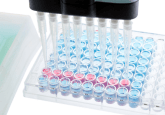Research into dementia diagnosis receives £1 million funding

The Engineering and Physical Sciences Research Council (EPSRC) recently announced the award of £1 million worth of funding to a project seeking to develop new diagnostic techniques for dementia. The research team involved in the project includes members from both Plymouth University and Swansea University (both UK). The project is one of eight studies supported by the EPSRC that are investigating ways to detect and diagnose dementia.
The research is led by Emmanuel Ifeachor from Plymouth University, where the team includes scientists from the School of Computing and Mathematics and the Peninsula School of Medicine. The researchers are working to develop a novel, real-time diagnostic technique for dementia using graphene technology, which will be jointly developed by scientists at Plymouth and Swansea Universities.
The new method of detection involves graphene-based biosensors, which are able to provide real-time data unlike existing techniques. This novel test can provide clinicians with conclusive data within minutes of sample collection. There is also potential that when combined with other graphene-based sensor technology, the accuracy of this technique will be increased, as results will be measured across multiple biomarkers.
The team behind the work hopes that this new point-of-care technology approach could change the landscape of dementia diagnosis. They see the technique developing into a low-cost simple blood test that could enable clinicians to detect dementia at an earlier stage, allowing more effective treatment and care. The new detection technique could also be used to track the responses of affected individuals to new therapeutics and treatments in clinical trials.
Ifeachor commented on the research project: “This is truly new technology and one which has enormous potential for improving the diagnosis of dementia, especially Alzheimer’s disease.” He added: “This is an exciting collaboration and our thanks go to the EPSRC for recognizing its potential impact.”;
Source: Plymouth University receives £1M to develop innovative dementia diagnostic technique.






